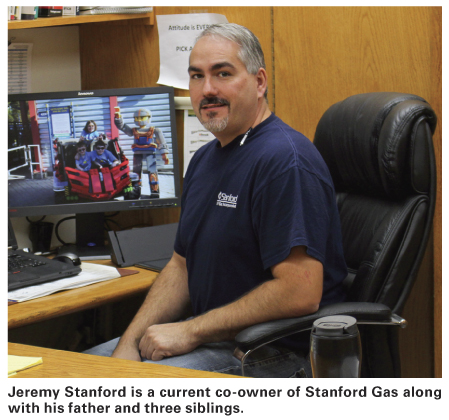
“My grandfather has been this way and my dad the same in that they’re definitely from the school of a handshake means something,” said Jeremy Stanford. “They both had a lot of integrity; they trusted and worked with people in the area. It’s a very rural community. Everybody knows everybody, and everybody helps everybody.”
The company has had a sense of community since the early days, when Dale and his wife Edna started out with a small general store not far from the current Midland office. Over time, they added LP-gas appliances such as cook stoves and refrigerators, and then made what has become a fairly common decision: selling the propane for those appliances. The couple set up 100-lb cylinder accounts for friends and family in the area. As the business grew, people began buying propane furnaces to heat their homes and businesses, and that pushed the Stanfords to install larger tanks instead of smaller cylinders. Dale and Edna eventually installed their own 18,000-gal. propane bulk storage tank.
The company still follows somewhat of an old-school approach to provide strong customer service, but it has also adapted well to the rapidly changing times. Duane Stanford, who is still active in the business in semi-retirement, and his children operate the company with the same core values of customer service that their grandparents advocated when they started the business. In addition to its main office in Midland, the company operates a second location in Gladwin, a third in Kawkawlin, and a satellite location with an additional 30,000 gallons of propane storage. Propane for residential heat is its core business, but it also provides propane for commercial, industrial, and agricultural uses, and Stanford LP Gas also services temporary heat, motor fuel, and forklift accounts. The business has offered propane motor fuel conversions for more than 20 years. Conversions from gasoline to bi-fuel propane are the most common, but the company performs dedicated propane conversions as well.
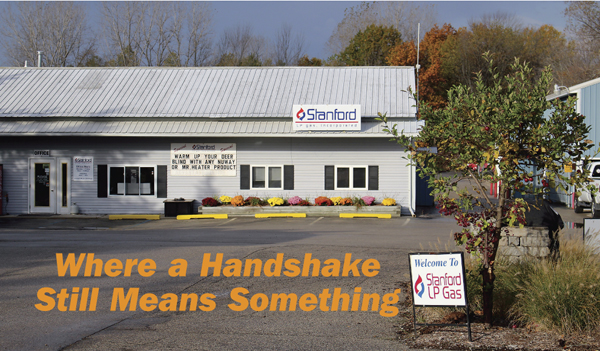
Duane Stanford has recognized that times are changing the way propane company owners must run their businesses. Fewer customers walk through the door now. They are placing orders online, making service requests online, and paying their bills online.
He led the company’s efforts to adapt to those changes, his son noted. Duane recognized that although some customers still like to come to the office, shake the owner’s hand, and chat in person, the new generation of customers wants to do business differently. He was one of the original members of the National Propane Gas Association’s Benchmarking Council, and Jeremy has been a council member for almost 10 years.
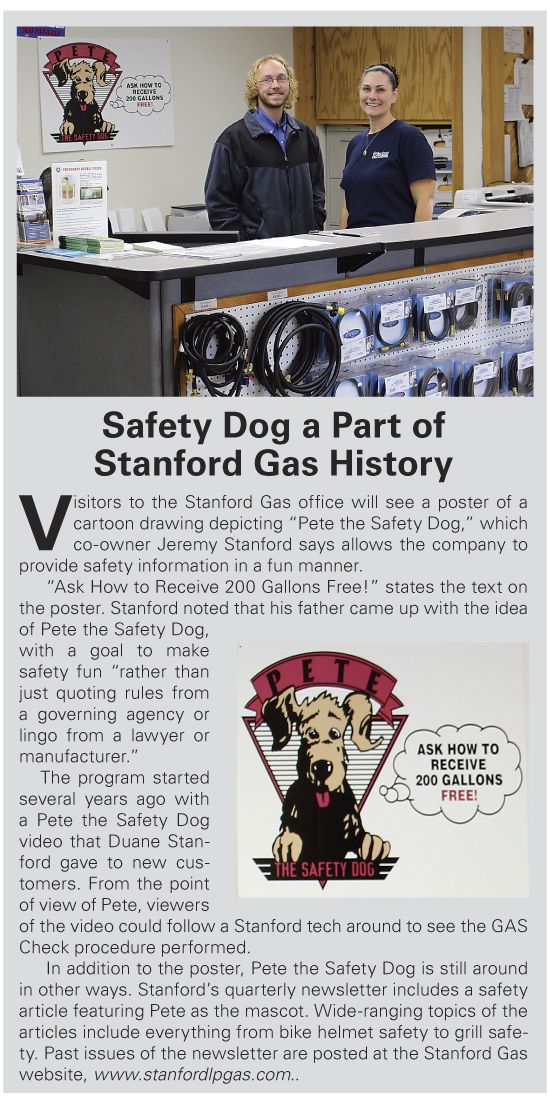
The founding Benchmarking Council members “were kind of on the forefront of looking at each others’ businesses and saying, ‘Hey, we’re seeing this trend, having this issue, or what are your thoughts on doing this,’” the younger Stanford noted. “I think that whole group has really blossomed and changed and made our businesses as well as our industry better.”
The development of personal relationships between Benchmarking Council members is the biggest benefit Jeremy Stanford has received from being with the group. Reaching out to other members for advice on business management issues has been a big help. But Stanford Gas has also put to use several ideas gained from attendance at the council meetings. A cap program was one idea that Stanford LP Gas implemented. The program involves allowing customers to receive a cap or limit on how high the price of propane goes while also providing customers “downside protection,” which allows them to receive the lower price if the price goes down. Some companies charge a fee for customers to be part of the cap program, but Stanford Gas does not.
The business has also initiated new programs on its own that have been successful. The company offers an Advantage Plan, which allows customers to look a year ahead and decide if they want to secure fuel for the next winter. If, for example, a customer at the present time wanted to purchase propane for winter 2016-2017, Stanford would secure the customer’s determined amount from its supplier for a minimal cost for the following winter.
Some of its customers watch propane prices very closely, and the Advantage Plan works well for several of them. Those customers sometimes question whether Stanford is purchasing fuel at the right time, and this allows them the flexibility of making that decision 100% on their own.
The Advantage Plan allows customers to time their purchasing decisions, similar to the stock market. “It more or less puts the ball in their court,” Jeremy Stanford stated. “They can secure fuel when they think it’s the best time.” The number of participants in the program has dwindled, however, as customers discover that timing the market is not as easy as they thought. Customers must know the right time to buy and sell. “Being perfect on both is pretty hard to do.”
He acknowledges the imperfections involved in running a business, and if you ask him for tips on managing a business well, he emphasizes the importance of not being afraid to make mistakes. A poster on the wall of his office features a quote from commentator Will Rogers: “Good judgment comes from experience, and a lot of that comes from bad judgment.” Jeremy Stanford notes that as he has taken over more responsibility in the business in recent years, his father has been understanding and patient with his son’s learning process. If the business finds itself in a tough spot, his father lets him figure out how to resolve it on his own.
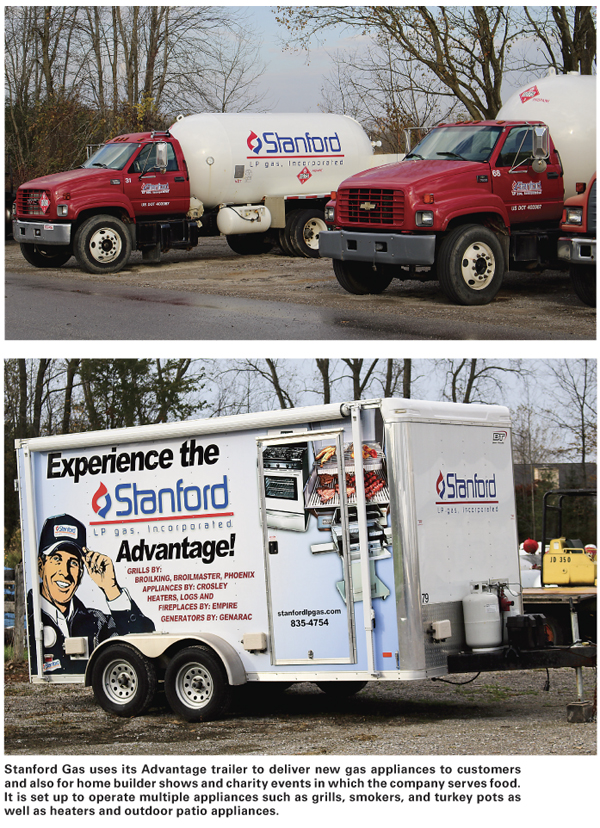
“He lets me not struggle, but learn a lesson,” the younger Stanford stated. “You make a mistake, you learn from that, and move forward. You become a better manager, and a better business operator. Of course, if it looked like it was going to be really bad, he’d step in and take ahold of the reins. But a lot of the time he lets me learn on my own and learn from my mistakes. It makes you a better individual and a better businessman.”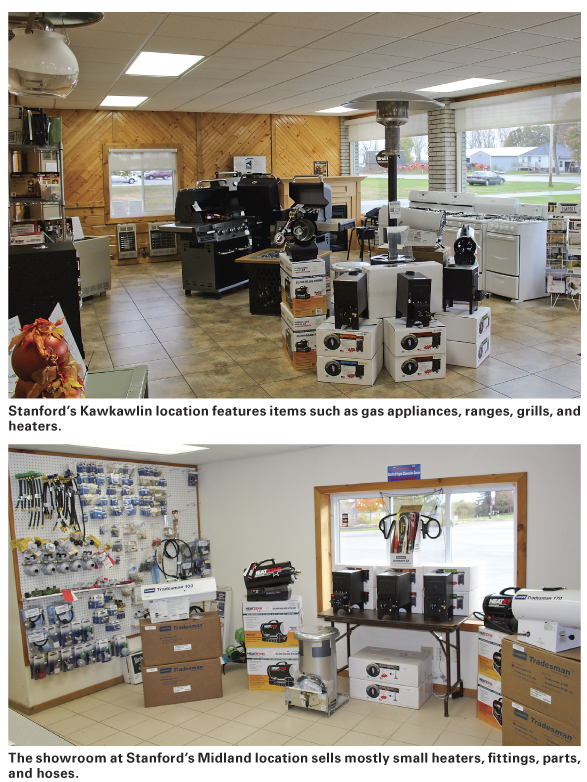
The business has continued to do well under Jeremy Stanford’s leadership, but he gives credit to top management and staff. Duane and Jeremy have advocated that their staff members get involved with the propane industry. Stanford’s sales and marketing manager Marvin Ockerman, operations manager Brian Lincoln, and motor fuel director Gary Shepherd have all served as president of the Michigan Propane Gas Association. Duane also served as association president and on various association committees, and Jeremy serves on the association’s NFPA 58 committee. Lincoln is chair of Propane Emergencies training for the association and travels two days per week every summer to help train responders. Ockerman is chair of the association’s Propane Emergency Responders Network, which assists first responders in emergencies and offers a toll-free number for responders to call for assistance.
Shepherd oversaw the implementation of the Stanford Gas’ motor fuel division in the mid-1990s and developed it into what the company now believes is one of the top propane conversion companies in North America. Manufacturers of propane conversion systems and vehicle original equipment manufacturers often contact Shepherd for advice. He has completed vehicle conversions for companies all over the U.S. as well as for Bermuda Gas on Bermuda Island and for Home Gas on the Cayman Islands. 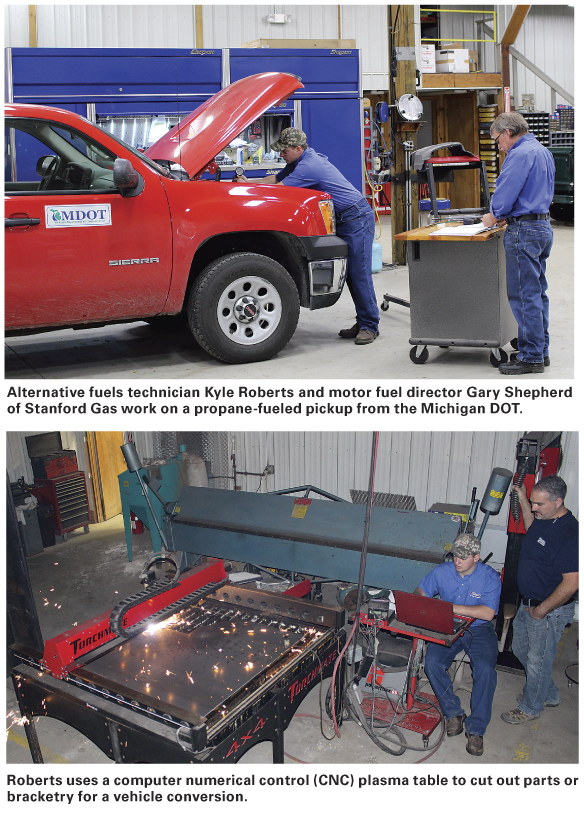
The company is in the middle of expanding its autogas business and is building a commercial propane fueling island at its satellite location. The unmanned station is open to commercial fleets and the public, but users must undergo training on proper use of the equipment. The station already has a regular customer lined up; a Midland, Mich. county bus service will fuel its propane-powered buses at the site. The bus service currently fuels at Stanford’s main location.
Shepherd oversees the conversion business, and Stanford technicians will install any system the customer wants on the vehicle. The conversion business itself is not a big profit-maker for the company, but it helps grow gallons sold.
Stanford Gas also continued its support of propane as an engine fuel this past winter and summer, when it purchased two Freightliner S2G propane-fueled bobtails. The trucks, which Stanford decorated with American flags, have worked well so far.
“Here in Michigan, it’s fairly flat, so we don’t really run into hills,” he noted. “But they have been more than adequate with power, torque, and drivability to get them in and out of driveways. They have been very suitable for what we need.”
The company will continue keeping up with the rapidly changing industry while continuing to operate with the ethical practices of its founders. Its website includes its code of ethics for customers, including “to be treated as an individual with friendliness, honesty, and respect,” “a complete guarantee of satisfaction,” and “honest and knowledgeable answers to your questions.”
“My grandfather and dad felt strongly about not necessarily that the customer is always right, but every customer deserves to be treated how they want to be treated,” Jeremy Stanford concluded. “We’ve always been very big on integrity. When we tell someone something, it means something. You want to take care of their needs, and every customer’s needs are different, so you have to tailor yourself to what that customer needs or wants. We’ve got a lot of good employees who go above and beyond every day trying to help meet those customers’ needs, for the betterment of our business and community and hopefully for the betterment of themselves.” —Daryl Lubinsky



